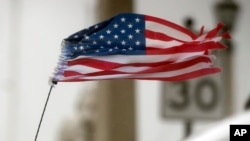On its current trajectory, Hurricane Matthew is not expected to have a direct impact on Washington, D.C. But as it barrels up the East Coast, pundits on both sides of the political spectrum are accusing each other of using the storm to advance their political agenda.
The hurricane is set to roll through several battleground states considered crucial to the presidential election, now less than five weeks away. The storm is also renewing a debate over global warming, which scientists have warned is making storms more intense.
On Friday, Matthew lashed central Florida, a state almost unanimously considered a must-win for Republican Donald Trump and Democrat Hillary Clinton. Clinton has a narrow lead in Florida, as well as in the swing state of North Carolina, where Matthew is expected to hit in the coming days.
The Category 3 storm is packing winds of up to 195 kilometers per hour. That’s significantly less powerful than it was when it swept across Haiti, where it left massive devastation and a death toll that is at least 800 and quickly rising.
In the U.S., so far one person has died. But the storm has also knocked out power to hundreds of thousands of homes and forced authorities to issue evacuation orders for more than 3 million residents. It’s a far cry from the destruction in Haiti, but it could have important political implications.
Voter deadlines
Many of those evacuated residents live in states where voter registration deadlines are fast approaching. Florida is of special concern to Democrats, who have vastly outpaced Republicans at last-minute voter registration efforts.
Clinton’s campaign Thursday called on Florida officials to extend the state’s October 11 voter registration deadline because of the storm. But Rick Scott, the state’s Republican governor, says he doesn’t intend to make changes, insisting “people have had time to register.”
Democrats may not be content to leave it at that.
Rick Hasen, a professor of law and political science at the University of California-Irvine, suggested on Twitter that if displaced Floridians are not allowed to register, and if officials don’t extend the deadline, Democrats could sue Scott, who chairs a Trump Super PAC.
Clinton ads postponed
The storm also caused political controversy in Florida after it was revealed that the Clinton campaign had purchased TV ads on the Weather Channel, which many in Florida and elsewhere tune into for hurricane coverage.
The Clinton campaign quickly postponed the ads after many Republicans accused them of trying to use the disaster for political gain.
Climate change views
The storm is also highlighting Trump's and Clinton’s differing views on climate change.
Trump does not believe in man-made global warming, saying any temperature fluctuation is the result of natural causes. He famously said in a 2012 tweet that global warming “was created by and for the Chinese in order to make U.S. manufacturing non-competitive.”
Clinton has called climate change “one of the greatest challenges of the 21st century,” and has supported green initiatives such as the 2015 global climate change pact agreed to in Paris. Trump has said he will cancel the agreement.
As the storm made landfall, both campaigns released statements that avoided making political arguments, instead focusing on the immediate needs of those in the storm’s path.
‘Exaggerating’ the storm
But on social media and among politically conservative commentators, the dire warnings ahead of the storm were seen as evidence that officials and forecasters were hyping the threat to bolster their political agenda on climate change.
Conservative political commentator Matt Drudge suggested in a tweet Thursday that the government is lying to the public about the intensity of the storm “to make an exaggerated point” on climate change. The National Hurricane Center has a “monopoly on data,” he said, adding that there is “no way of verifying their claims.”
Talk radio host Rush Limbaugh also chimed in, saying National Hurricane Center forecasts should be treated with skepticism.
“There’s politics in hurricanes. There’s politics in the forecasting of hurricanes, because there are votes,” Limbaugh said Thursday on his nationally syndicated radio show.
The comments tap into widely held skepticism about global warming and whether it is being influenced by human activity. A poll released earlier this year by Monmouth University suggested that only 27 percent of U.S. citizens believe human activity is the main cause of climate change.
Superstorm Sandy
It’s not the first time a presidential election was affected by a hurricane. In 2012, Superstorm Sandy made its way up the East Coast, killing more than 100 people in the U.S. and causing $50 billion in damage just four days before the presidential election.
One of the enduring political images from that storm was President Barack Obama, who was running for re-election, embracing Republican New Jersey Governor Chris Christie, as the two coordinated the response to the storm. Obama, a Democrat, went on to defeat Republican Mitt Romney, and many say the positive image of bipartisan cooperation helped his cause.





